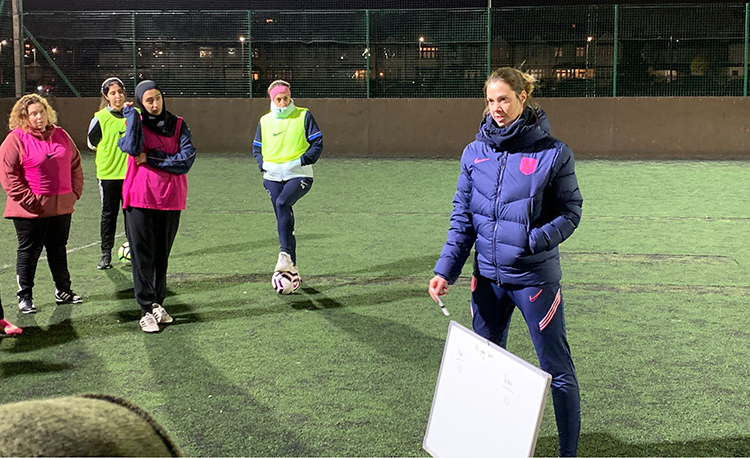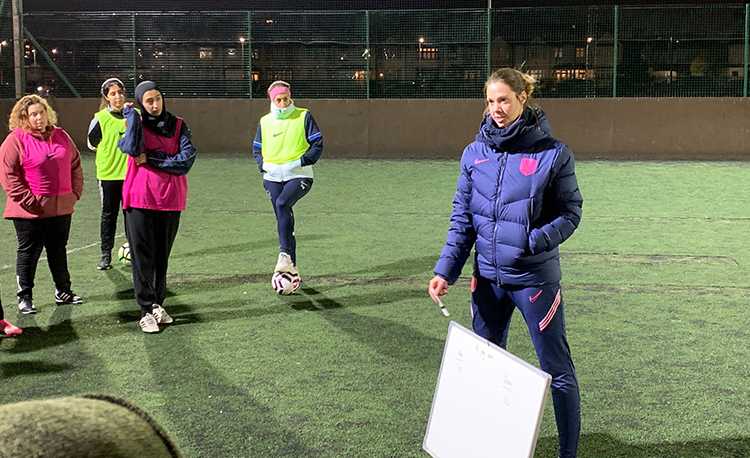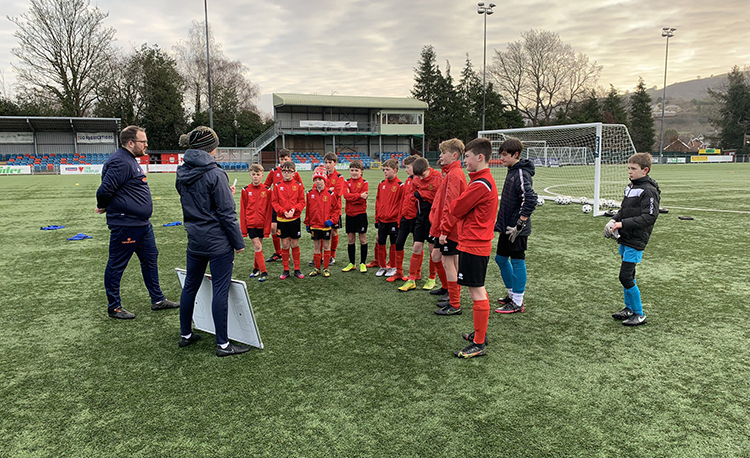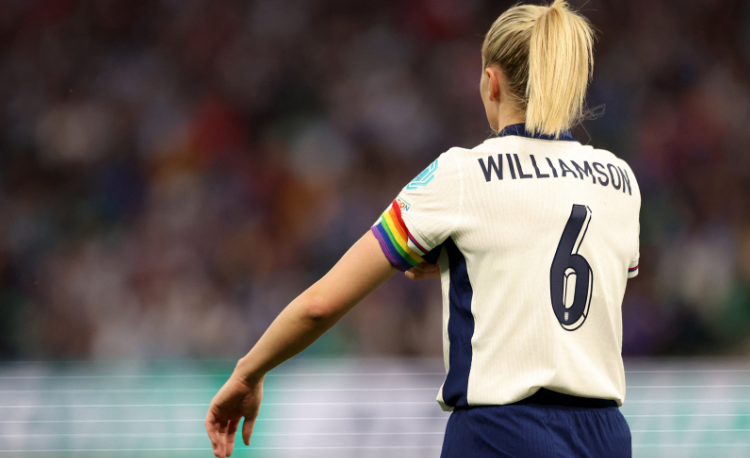Debbie Barry: 'We want to develop good human beings'
Under-16s coach and coach development officer Debbie Barry talks squad culture and creating a harmonious team environment.
Debbie Barry did her FA Level 1 coaching qualification when she was at university in Liverpool.
She didn’t coach for a number of years after that, believing there wasn’t a career available to her. Instead, she chose teaching.
In 2019, a visit with a school colleague to Doncaster Rovers Belles’ training facility reignited her interest in coaching.
Three years later, Debbie is now both the u16s coach at the Belles’ Regional Talent Centre (RTC) and a coach development officer at the Football Association (FA).
SCW caught up with Debbie to talk about environment and team culture, touching on what a good set up looks like and how coaches can help create one…
SCW: Why is it so important for coaches to emphasise and build a really healthy environment and team culture?
DB: "I think it’s a really important foundation. With my teaching background, it’s something we’re always aware of, making the classroom that environment: safe, fun and challenging for students to learn.
"I don’t think there’s much of a difference when taking that over to the coaching side of things. You want the environment to be somewhere where you develop your players - you want them to reach their potential, but you need to put some things in place for them to be able to do that.
“I think it starts with the people who are there - the right leadership - and also having the right kind of vision and values is really important.
"People who are working there need to buy into this. It starts from the top, filters down to coaches, and, certainly in youth football, parents need to get on board too.
"But most importantly, the players need to see those visions. Those clear goals need to be set out at the start of the year. They need to be achievable.
"We don’t want to set anything too high because we want our players to be able to reach that, to encourage them in their development.”
SCW: What are some examples of positive goals and values?
DB: “Whenever I’m coaching, I go for a holistic approach. As much as it’s important to develop the technical, tactical and physical side of things, we also want to develop good human beings, [with] integrity, honesty, commitment and dedication.
"It starts with the right leadership and having the right kind of vision and values..."
"All of those are life skills that our girls will need later in life, whether they have a career in football or not.
"Certainly, that’s what we would encourage in the team environment, because that’s something that they can take with them for the rest of their lives.”
SCW: Do you think it starts with us as coaches role modelling some of those behaviours?
DB: "Absolutely, because you’re front and centre. You’re there all the time with them and they look up to you, whether you realise it or not.
"I think we have a really important role as coaches - we need to be doing the right things, and speaking the right way, because people do notice.
“It definitely starts with us. Sometimes we don’t realise the effect we can have on others, so it’s really important we have that mindset that we model this behaviour so that hopefully others will see that and maybe learn from it.”
SCW: How can we make sure that once we’ve defined what the culture is, that we are bringing it through in all of our sessions and match days?
DB: "That’s the challenge, isn’t it? Because you set your goals and your visions at the start of the year and life happens. There’s different situations, things can change.
"It’s important that the vision and the values are in broad terms, so there is that opportunity to change.
"The good thing about environment and culture is it doesn’t have to stay like that forever. It isn’t permanent.
"I think we need bravery to be adaptable and flexible and if we start to see things that are changing, that we can change as well.
"It’s difficult, setting something out, but at the end of the year reflecting on it.”
SCW: If there are instances in sessions or on match days where you see something that maybe doesn’t match up with the positive environment you’re trying to create, how can we challenge that in the right way?
DB: "It’s a difficult thing to do. Sometimes difficult conversations need to be had with your players.
"It comes back to your relationship with them. Can you actually have those conversations? Is the respect there?
"Looking back on myself as a player, at the coaches that I had respect for, things were fair and communicated properly, I would have done anything for them.
“I would hope that I can build that rapport and relationship with my players [so] that if conversations need to be had, they’ll listen and take things on board.
"It’s having that two-way process - it’s not a dictatorship, it’s a conversation, trying to work things out together.
"As much as we as coaches can set the parameters for the environment, it’s the team that really develops the culture themselves. It’s the individuals in there - the characters, the personalities - that will ultimately drive it.
“During lockdown, I got obsessed with Legacy [by James Kerr], the Michael Jordan documentary [The Last Dance], Eleven Rings by Phil Jackson and books like the ones written by [former England rugby union head coach] Clive Woodward - all had really successful high-performing teams.
"It’s having that two-way process. It’s not a dictatorship, it’s a conversation..."
“The one common thread running through them was the culture of the team, that was set up by the individuals at the time.
"There’s only so much we can do as coaches. It’s the players, at the end of the day, that will create that and hopefully they’ll get on.
"They don’t have to be best friends, but it helps if they can do things off the pitch together. They’re more likely to fight and work for each other on the pitch come matchday."
SCW: What advice would you give to a relatively new coach working with a group and looking to develop a positive environment and team culture?
DB: "I think it’s important to have some team building activities to get to know your players, and give them the opportunity to get to know each other.
"But it’s also important to establish expectations early on, and boundaries. We can have all this fun, when things are enjoyable and we’re having a good time, but at the end of the day, you’re here to work.
"I think it’s important to get those relationships right really early on. It doesn’t happen overnight, it doesn’t happen in a week. It takes time and you might reflect back and think it isn’t going well, but you just need to stick with it.
"Trust the process, have good people around you who can support you and help you. Ultimately, things will start to click into place.”
Related Files
Newsletter Sign Up
Coaches Testimonials

Gerald Kearney, Downtown Las Vegas Soccer Club

Paul Butler, Florida, USA

Rick Shields, Springboro, USA

Tony Green, Pierrefonds Titans, Quebec, Canada
Subscribe Today
Discover the simple way to become a more effective, more successful soccer coach
In a recent survey 89% of subscribers said Soccer Coach Weekly makes them more confident, 91% said Soccer Coach Weekly makes them a more effective coach and 93% said Soccer Coach Weekly makes them more inspired.
*includes 3 coaching manuals
Get Weekly Inspiration
All the latest techniques and approaches
Soccer Coach Weekly offers proven and easy to use soccer drills, coaching sessions, practice plans, small-sided games, warm-ups, training tips and advice.
We've been at the cutting edge of soccer coaching since we launched in 2007, creating resources for the grassroots youth coach, following best practice from around the world and insights from the professional game.









